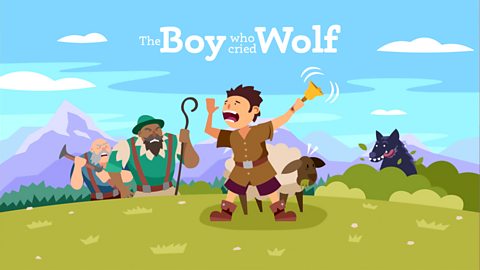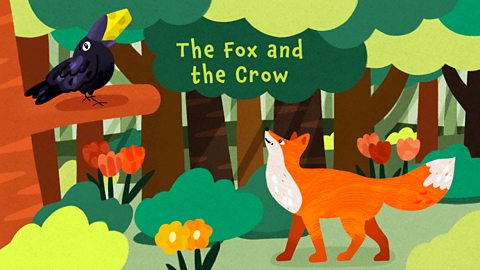Aesop's famous fable is read by the late Richard Briers in this adaptation combining text, audio and illustrations.
The video
THE BOY WHO CRIED WOLF
A young boy got a job with a shepherd.
‘Just keep your eyes open and look out for wolves,’ said the shepherd. ‘Wolves always try to eat my sheep. If you see one, ring this bell and shout out Wolf! Wolf! Then we’ll come running with our guns. Can you do that, boy?’
‘Don’t you worry, Mr Shepherd,’ said the boy. ‘Your sheep are safe with me.’
The boy took the sheep up into the hills and sat down with his bell.
‘Don’t worry sheep,’ he said. ‘I’m here now. I’m in charge. You’ll be safe with me.’
All morning the boy sat in the grass looking for wolves.
‘I expect they’re hiding,’ he said to the sheep.
That night the boy took the sheep back to the village. The shepherd counted his sheep and was very pleased.
‘Well done,’ he said. ‘All safe. Same again tomorrow?’
‘Yes, sir!’ said the boy.
The next day was exactly the same as the first day. The boy took the sheep to the hills and sat down with his bell looking for wolves. There weren’t any.
The boy noticed that the day felt very long. There was no-one to talk to…except sheep…and the sheep never talked back…they just ate grass…all day…
By the fifth day the boy was very bored with his job. He looked up at the mountains. Not a wolf in sight. He looked down at the bell and he thought: ‘Maybe I could just pretend there’s a wolf.’
So he picked up his bell and rang it, shouting: ‘Wolf! Wolf! Hurry! Come quickly! There’s a big old wolf coming!’
Soon he could hear the sound of men running up the hill.
‘Where is it?’ said the shepherd.
‘Gone,’ said the boy. ‘He just ran off.’
‘Well done, boy,’ said the shepherd. ‘You saved my sheep.’
The other men all patted the boy on the head and said how brave he’d been and what a good job he’d done.
The boy felt so proud and pleased with himself that he almost forgot that he’d made the whole thing up.
A few days later he was bored again.
‘The only good day I had in this job was when I pretended there was a wolf,’ he told the sheep. ‘And I rang my bell and all the men came and told me what a good job I’d done. It was brilliant.’
He looked at his bell. And that’s when he decided to do it again.
He rang, he shouted and again the men came running.
‘Where is it?’ said the shepherd.
‘Gone,’ said the boy. ‘Ran away.’
This time the men didn’t say ‘well done’ and pat him on the head. This time they looked at the boy like they didn’t believe him.
‘There was a wolf. Honest!’ he said.
The men just walked back to the village without speaking.
Now the boy felt really sorry for himself.
‘They know I rang my bell when there was no wolf.’
Then out of the corner of his eye he saw a movement - a big grey thing was coming down the hillside heading straight for the sheep.
The boy rang his bell and he shouted. ‘Wolf! Wolf! Come quickly! There’s a wolf!’
Down in the village the men heard the bell ring and just carried on working.
‘Little fool,’ said the shepherd. ‘Does he really think we’ll fall for that again?’
The boy kept ringing his bell. There were tears in his eyes as he watched the wolf make a meal of one of the shepherd’s fattest sheep.
‘I rang my bell but nobody came,’ the boy told the shepherd that evening.
The shepherd nodded. ‘Nobody believes a liar…even when he’s speaking the truth.’
The Boy who cried Wolf
A young boy gets a job with a shepherd looking after his flock of sheep and each day he takes them up into the hills to graze. If he sees a wolf he is to ring the bell he has been given and shout 'Wolf!'
Soon the boy is feeling bored: the days are long and there is no-one to talk to. So he decides to pretend there is a wolf. He rings the bell and shouts 'Wolf!' and the men from the village come running with their guns. The boy tells them the wolf has already run off and the men are pleased with the boy and pat him on the back.
A few days later the boy is feeling bored again and decides to cry 'Wolf!' once more. This time when the men arrive and discover no wolf they are unimpressed and the boy worries that they don't believe him.
Shortly after the boy is minding the sheep when a wolf really does appear and attacks the sheep. The boy rings his bell and shouts 'Wolf!' but no one comes. Down in the village the men hear the boy but presume he is lying. As the shepherd says that night: 'Nobody believes a liar…even when he's speaking the truth.'
Reader: Richard Briers
Writer: Rob John
Illustrations: Jake Cawthray
Video questions
- What job does the boy get? (He must take the sheep into the hills to graze and look out for wolves)
- What must the boy do if he sees a wolf? (Ring his bell and shout 'Wolf!')
- Why does the boy decide to pretend there is a wolf? (He is bored: he hasn't seen a wolf, the days are long and there's no one to talk to)
- How do the men treat the boy the first time they come running? (They are pleased with him and pat him on the back)
- How do they treat the boy the second time they come running? (They are not pleased with him; they don't thank him or pat him on the back)
- Why do you think the men treat the boy this way? (They think he might be lying about the wolf)
- What happens when the boy really does see a wolf? (He rings his bell but the men ignore him)
- What do you think we can learn from the story? What is its moral? (That if you are known as a liar you won't be believed - even when you tell the truth)

Resources
The Boy who cried Wolf. document
Download / print the story as a pdf

Teacher Notes
Download / print the notes for this story as a pdf

See also...
The Hare and the Tortoise. video
Aesop's famous fable about a race between a hare and a tortoise is read by the late Richard Briers.

The Fox and the Crow. video
Aesop's fable about a wily fox and a proud crow is read by Jonathan Pryce.

The North Wind and the Sun. video
Aesop's fable about a competition between the wind and sun is read by Lindsay Duncan.

- See more Aesop's Fables from BBC Teach.